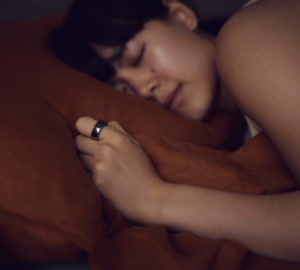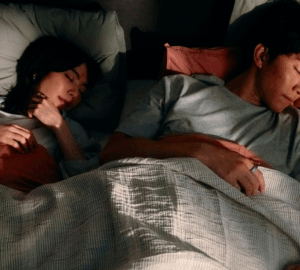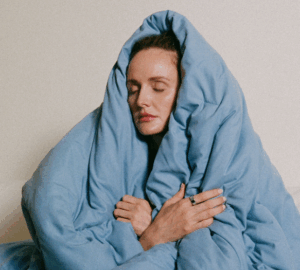A new year brings new opportunities for change, and there’s no better time than now to start making positive changes to your sleep routine. Below, we’ll explore some of the most common bad sleeping habits and offer some practical tips and strategies to help you break them. But before we get there, it’s equally important to understand the science of sleep.
RELATED: Tired but Can’t Sleep? Here are 5 Possible Reasons Why
Understanding the Science of Sleep
Understanding the science of sleep makes it easier to understand how bad sleeping habits affect the way we sleep and how to improve sleep quality. Your sleep cycles, particularly random eye movement (REM) and non-REM sleep, is one of the most important aspects of sleep science.
REM sleep is vital for cognitive function and memory while non-REM sleep is essential for physical repair and restoration. The body requires both types of sleep to function properly, and a disruption in one can have an impact on the other. Unfortunately, bad sleeping habits can disrupt these important parts of the sleep cycle, resulting in an inconsistent sleep schedule, poor sleep quality, and even a slew of health issues.
6 Surprising Bad Sleeping Habits
You’ve probably heard of the common bad sleeping habits such as sleeping with your electronic devices next to you, a too-warm bedroom, or smoking and drinking before bed, but here are some surprising sleeping habits that you may not be aware of.
1. Sleeping On a Full Stomach
You probably know that late-night meals, as well as sleeping on an empty stomach, can have a negative impact on your sleep. But did you know that food can cause your body to become warmer in bed? Here are 3 surprising effects of having an active digestive system when you go to bed:
- Temperature increase: Eating a large meal before bed can raise body temperature. This is contrary to the body’s normal cooling process during sleep and makes it harder to fall asleep.
- Increased blood flow to the stomach: A full stomach requires more blood flow to help with digestion. This can divert blood flow away from the brain and other organs, disrupting a peaceful sleep.
- Interference with REM sleep: Eating close to bedtime can also interfere with REM sleep, leading to having less of this mentally restorative sleep stage.
| Member Tip: Opt in for Oura Labs and start using Meals. When you log your meals, Oura will analyze the contents and timing of your meals to help you understand the effects of your eating habits on your sleep and overall health. |
2. Stressful Interaction with Your Bed Partner
If you sleep next to a partner, having poor interactions with them during the day can affect how well you sleep at night. Studies have shown that people who report high levels of relationship dissatisfaction and conflicts tend to have more sleep disturbances, such as difficulty falling or staying asleep, as well as poor sleep quality.
For example, having arguments or unresolved conflicts with your bed partner can lead to feelings of stress and anxiety, which can make it difficult to relax and fall asleep. To improve the quality of your sleep, it’s important to address any issues or conflicts that you may have.
| Member Tip: Unwind by listening to a relaxing sleep story, meditation, or breathing exercise on the Oura App within Explore content. |
3. Not Wearing the Right Sleep Attire
Putting on sleepwear can signal the brain that it’s time to sleep. However, it’s important to have the right PJs: In fact, one study found wool sleepwear provided statistically significant sleep benefits.
Of course, the material you choose for your sleepwear should be based on what is most comfortable for you. When shopping for sleepwear, consider fabrics that can regulate body temperature, such as cotton or wicking fabrics if you tend to be warm at night, or flannel or wool if you are often chilly.
If you wear socks to bed, it’s a good idea to change them before going to bed since perspiration can accumulate in socks throughout the day, resulting in cold toes and sleep problems.
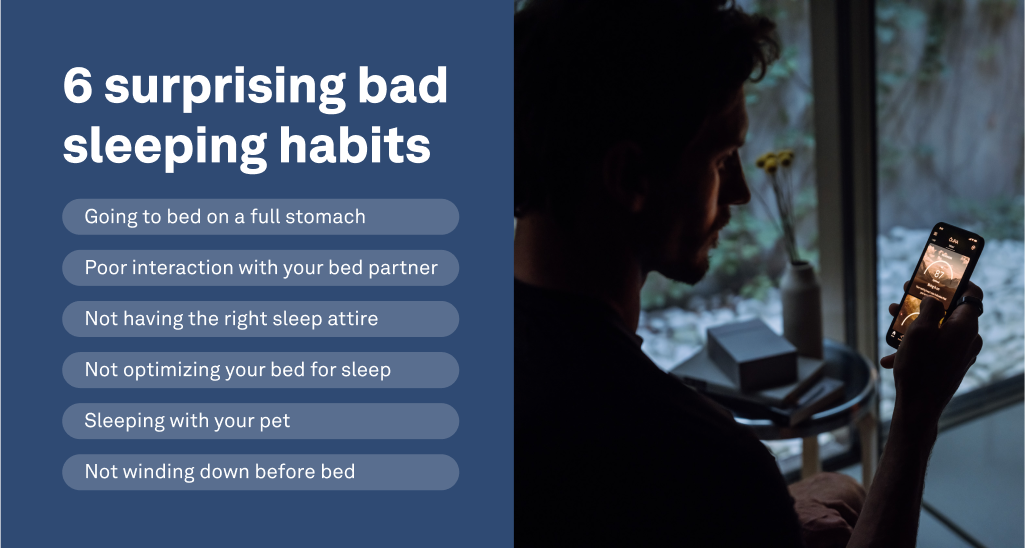
4. Not Optimizing Your Bed for Sleep
Getting your room temperature and lighting right is vital for improving how well you sleep, but keep in mind that creating a comfortable sleep environment goes beyond this.
Reading or working from bed, for example, can cause your brain to associate the bed with activities you do while awake. This can impair your ability to unwind and fall asleep. You may also be guilty of lying in bed trying to force yourself to sleep. This can trick your brain into thinking that lying awake in bed is fine, making it even more difficult to sleep. If you’re having trouble falling asleep, it’s best to get out of bed and return only when you’re truly tired and ready to sleep.
Another issue that can contribute to a less-than-ideal sleeping environment is sleeping with too many pillows on the bed. Doing this can put your head and neck at an unnatural angle, causing pain and discomfort.
RELATED: How to Choose the Best Bedding for a Better Night’s Sleep
5. Sleeping With Your Pet
While some people may find comfort in sleeping with their pets, having your pet in bed can disrupt your sleep in various ways:
- Your pet may move around during the night, making noise or seeking attention, which can disturb your sleep.
- Most animals have their own sleep-wake cycles, which may not align with yours, leading to sleep disturbances.
- Your pet may have a medical condition such as insomnia or sleep apnea, which can make them restless at night. This can disturb your sleep as well.
- A pet can take up too much space on your bed, making it uncomfortable to sleep. This is especially problematic if you have a small bed or already struggling with sleep issues.
6. Not Winding Down Before Bed
Going to bed immediately after a stimulating activity such as watching a thriller movie, playing video games, working out, or working on a big work project can make it difficult to relax and fall asleep. It’s easy to understand why when you consider what this type of activity does to your brain and body.
Stimulating activity can activate the brain and increase cognitive activity. For example, watching a horror movie can increase the release of adrenaline and other stress hormones, which can make it difficult to relax and fall asleep.
Moreover, stimulating activity can also expose the body to artificial light, which can suppress the production of melatonin, a hormone that regulates the sleep-wake cycle. This not only disrupts the body’s internal clock, but also makes it difficult to fall asleep or wake up the next morning.
READ MORE: 14 Science-Backed Ways to Wind Down Before Bed
8 Tips to Fix Poor Sleeping Habits
Make a plan: Make a list of your goals and the specific steps you intend to take to achieve them. This can include creating a consistent sleep schedule, limiting coffee and alcohol consumption, and avoiding electronic devices before bed.
Stick to a consistent sleep schedule: Going to bed and waking up at the same time each day can train the body to stick to a consistent sleep schedule, making it easier to sleep and wake up feeling refreshed.
Avoid electronic devices before bed: To allow the brain to relax and prepare for sleep, avoid using electronic devices for at least an hour before bed. Blue light from electronic devices can suppress melatonin production, making it difficult to sleep.
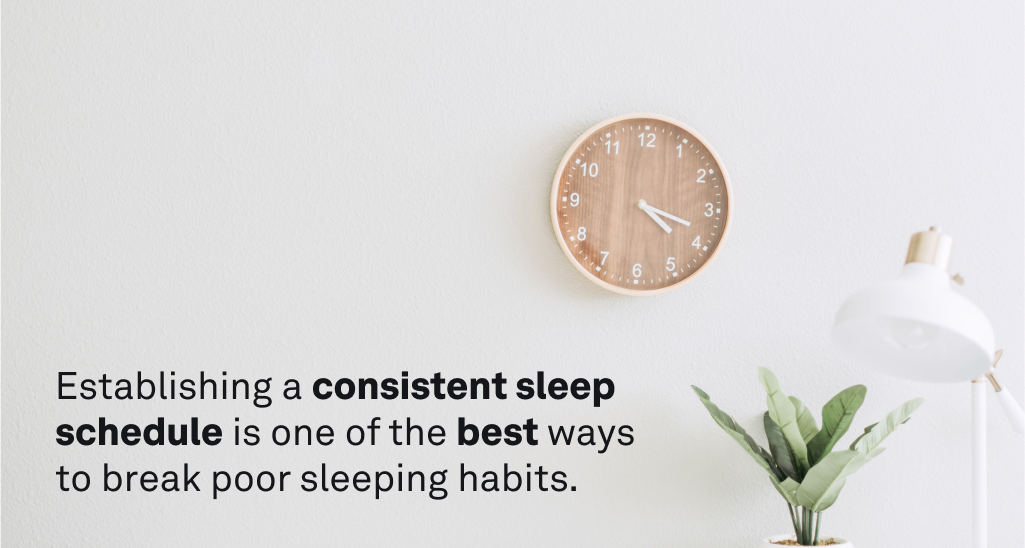
Limit caffeine and alcohol: Caffeine has a long half-life and should be avoided for at least 4-6 hours before bedtime. Alcohol, on the other hand, can cause insomnia and even nightmares, thereby disrupting the sleep cycle.
Eat light before bed: As mentioned earlier, going to bed on a full stomach is a recipe for a poor night’s sleep. It’s a good idea to avoid heavy meals, spicy foods, and foods high in sugar or fat before bedtime. If you must eat, go for a light, healthy meal that helps to promote digestion and relaxation.
RELATED: How Can Fasting Improve Your Sleep?
Create a comfortable sleep environment: Make sure to keep the bedroom cool and dark, and get a comfortable mattress, pillows, and bedding. You should also consider keeping your pet out of the bed and getting comfortable sleepwear.
Be patient & reward yourself: Change takes time and effort, and your body will need time to adjust to new habits, so don’t give up if you experience some setbacks. Setting small rewards for meeting your sleep goals can help you stay motivated. When you reach your goals, reward yourself with something special, such as a massage or a night out with friends.
Don’t be afraid to seek support: Share your goals and progress with your friends and family. They can hold you accountable while also providing encouragement and support. Also, consider seeking professional assistance if you are having difficulty sticking to your plan or if you have underlying sleep disorders.
Breaking Bad Sleeping Habits in 2025
By breaking bad sleeping habits, you can take control of your sleep and make 2025 the year you start waking up refreshed and rejuvenated every day.
You can also optimize your sleep with some help from Oura. With sleep staging accuracy that matches the gold standard sleep lab test, Oura provides in-depth sleep analysis, allowing you to learn how your daily activities affect the quality of your sleep. Plus, you get personalized recommendations to help you improve your sleep.
| Member Tip: Tag sleeping habits like “heavy meal,” “magnesium,” or “cold shower” to see how these habits impact your sleep. When you regularly tag them, you may get a personal Discovery—showing the relationship between the habit and your individual biometrics. |
READ MORE: How Carbs Before Bed Impact Your Sleep







